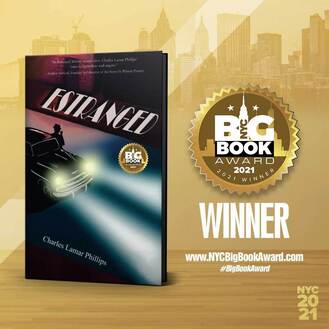NEW & NOTABLE
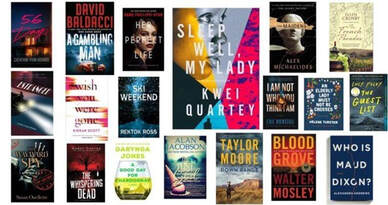
Estranged recognized by The Strand magazine as a top mystery of the year
From the interview with Charles Phillips:
"This thing, this story, just seemed so right to me. I began to think I might use both Cecil Parker of the Capitol Times and the noir patois of tough-guy fiction to portray the sense of paranoia and pettiness I had experienced in grad school and my early working life. I would do it all, I thought, in a historical novel set in 1950 with the true beat of American life in words and their sounds."
Click here for the full interview
From the interview with Charles Phillips:
"This thing, this story, just seemed so right to me. I began to think I might use both Cecil Parker of the Capitol Times and the noir patois of tough-guy fiction to portray the sense of paranoia and pettiness I had experienced in grad school and my early working life. I would do it all, I thought, in a historical novel set in 1950 with the true beat of American life in words and their sounds."
Click here for the full interview
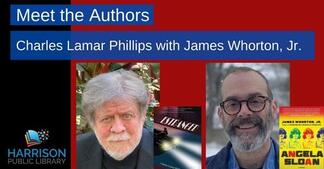
Meet the Authors from the Harrison Public Library
Charles Lamar Phillips, author of the historical novel Estranged, set in the 1950s Joseph McCarthy Communist witch hunt era is in conversation with James Whorton, author of the novel Angela Sloan, set in the 1970s Watergate era, a time of personal political obsessions and paranoia. They discuss how they used politics, extreme characters, contentious situations, problematic figures in history, and prickly current issues to create their novels.
Click here for the full broadcast
Charles Lamar Phillips, author of the historical novel Estranged, set in the 1950s Joseph McCarthy Communist witch hunt era is in conversation with James Whorton, author of the novel Angela Sloan, set in the 1970s Watergate era, a time of personal political obsessions and paranoia. They discuss how they used politics, extreme characters, contentious situations, problematic figures in history, and prickly current issues to create their novels.
Click here for the full broadcast
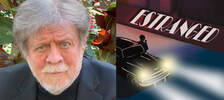
Fiction Writers Review Interview:
How History Happens: A Conversation with Charles Lamar Phillips
Click here for the full interview

LITHUB EXCLUSIVE:
See major exclusive excerpt from Estranged featured on LitHub
crimereads.com/excerpt-estranged/
See major exclusive excerpt from Estranged featured on LitHub
crimereads.com/excerpt-estranged/

Estranged on Sale NOW
Award winning novel available in paperback and special edition hardback
www.regalhousepublishing.com/product/estranged/
Award winning novel available in paperback and special edition hardback
www.regalhousepublishing.com/product/estranged/
|
Estranged
In a tale whose events and themes very much reverberate in Trump’s America, the novel addresses surprisingly contemporary concerns about gender, homosexuality, and sexism, although at an oblique, historical angle. This is a story that occurs at the intersection of public and private life, of love and work with politics and history. "Edgy and richly cinematic, ESTRANGED is noir storytelling at its finest. With its crooked politicians, galloping pace, sleek prose, and farm boy turned dogged city editor, this novel is exhilarating, proffering pitch-perfect slang, the heat of tough choices, and the rowdy fun of ordering a Scotch at lunch." — Margot Douaihy, PhD, author of Scorched Grace: A Sister Holiday Mystery “Charlie Phillips is a smart, funny, open-eyed writer who salts his pages with discarded illusions. Tough and good: we could use more writers like him.” — James Whorton, Jr., author of Angela Sloan, Franklin, and Approximately Heaven “In Estranged, history comes alive. Charles Lamar Phillips’s voice is immediate and urgent. This novel will suck you in and you’ll want to spend as much time as possible with the complicated and interesting world he’s built.” —Andrew Gifford, founder and director of the Santa Fe Writers Project |
|
"In Estranged, Charles Lamar Phillips anchors the reader in the Midwest of 1950, a time when politicians made deals in smoke-filled rooms, hard-drinking journalists sparred with them, and reputations could be ruined by extramarital dalliances, one’s sexual orientation, or a youthful affiliation with the Communist Party. The crackling plot, full of spot-on period details and dialogue, propelled me forward, but the sentences were so well crafted, I slowed down to savor them. This is one of those novels that perfectly recreates another place and time while also underscoring universal truths."
— Jan English Leary, author of Thicker Than Blood and Skating on the Vertical
“In sentences that capture the sensory specifics of late-1940s America, from ‘rotten fruit and stale shoe polish’ smell of printers’ ink to the greased hair and cheap suit of its hack politician villain, Charles Lamar Phillips’s novel re-creates a low and dishonest moment in our past that uncomfortably resembles the depths to which we have since fallen. In 'Red' Randall Harker and his fall, persecuted by a puffed-up anti-Communist mid-western Senator, Phillips gives us the view from inside a witch-hunt’s target, the lived experience of the political scapegoat. If we’re lucky, Phillips’s powerful rendering is as close as most of us will get to such experience. With this hard-boiled and compelling portrait, that’s close enough for me.”
—Michael Thurston, former fiction editor of Massachusetts Review, author of Houses from Another Street, and Provost and Dean of Faculty, Smith College
"From the first page of Estranged, Charles Lamar Phillips taps into the very best of the noir genre. And then he cranks it up to eleven. This is the story of Randall Harker, an ex-communist, city editor at a Midwestern newspaper, who finds himself in the crosshairs of a shady senator during the Red Scare in the 1950s. Point-blank, it's obvious that Harker's career, marriage and reputation are toast. But readers will keep turning the pages to find out if he can survive a ruthless smear campaign with his sanity, and his soul, intact.
In a novel eerily reminiscent of our modern American nightmare, Phillips's snappy prose weaves a sticky web of political sabotage, chock-full of gangsters, grifters and heroes with a bent moral compass. The smell of newspaper ink, Scotch and fear oozes off the page, from the first chapter to the last. Estranged is a heckuva good book for anyone who loves quality fiction. And Phillips is an author with talent."
-- Adam Kovac, author of The Surge
“There should be more novels about that scary time and place for anyone with a questioning mind – McCarthyst USA. Estranged sprints along, drags you convincingly into the times, injects the ice of dread into your veins. These were the times when an accusation of ‘communist!’ could get free any public figure from allegations of corruption. Lord, how familiar this feels! A great yarn, and how very appropriate for our own times it is.” .
— JL Crozier, author of What Empty Things Are These
— Jan English Leary, author of Thicker Than Blood and Skating on the Vertical
“In sentences that capture the sensory specifics of late-1940s America, from ‘rotten fruit and stale shoe polish’ smell of printers’ ink to the greased hair and cheap suit of its hack politician villain, Charles Lamar Phillips’s novel re-creates a low and dishonest moment in our past that uncomfortably resembles the depths to which we have since fallen. In 'Red' Randall Harker and his fall, persecuted by a puffed-up anti-Communist mid-western Senator, Phillips gives us the view from inside a witch-hunt’s target, the lived experience of the political scapegoat. If we’re lucky, Phillips’s powerful rendering is as close as most of us will get to such experience. With this hard-boiled and compelling portrait, that’s close enough for me.”
—Michael Thurston, former fiction editor of Massachusetts Review, author of Houses from Another Street, and Provost and Dean of Faculty, Smith College
"From the first page of Estranged, Charles Lamar Phillips taps into the very best of the noir genre. And then he cranks it up to eleven. This is the story of Randall Harker, an ex-communist, city editor at a Midwestern newspaper, who finds himself in the crosshairs of a shady senator during the Red Scare in the 1950s. Point-blank, it's obvious that Harker's career, marriage and reputation are toast. But readers will keep turning the pages to find out if he can survive a ruthless smear campaign with his sanity, and his soul, intact.
In a novel eerily reminiscent of our modern American nightmare, Phillips's snappy prose weaves a sticky web of political sabotage, chock-full of gangsters, grifters and heroes with a bent moral compass. The smell of newspaper ink, Scotch and fear oozes off the page, from the first chapter to the last. Estranged is a heckuva good book for anyone who loves quality fiction. And Phillips is an author with talent."
-- Adam Kovac, author of The Surge
“There should be more novels about that scary time and place for anyone with a questioning mind – McCarthyst USA. Estranged sprints along, drags you convincingly into the times, injects the ice of dread into your veins. These were the times when an accusation of ‘communist!’ could get free any public figure from allegations of corruption. Lord, how familiar this feels! A great yarn, and how very appropriate for our own times it is.” .
— JL Crozier, author of What Empty Things Are These
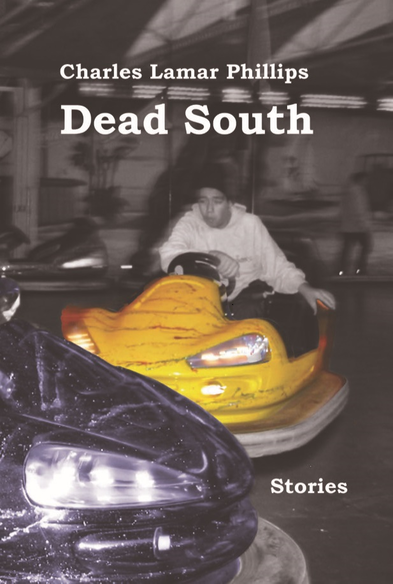
Dead South
A Collection of Short Stories available from Fomite Press
“Funny, raw, smart, and with a true ear for the ragged music of a certain Southern English—that's how Charles Lamar Phillips's stories hit. It's fine work that feels drawn from life.”
—James Whorton, Jr., author of Angela Sloan, Frankland, and Approximately Heaven
“The humane, curious, and sympathetic eye of Charles Lamar Phillips is on full display in the virtuosic short stories of Dead South. Reading this book is an immersive and—corny as it probably sounds—life-affirming experience. Phillips is a gifted and supremely original writer.”
—Christine Sneed, author of The Virginity of Famous Men and Little Known Facts
“These are skillfully rendered tales of troubled souls—young and old, innocent and not so innocent—searching for meaning in lives past and present and doing so in a time and region wrapped in tradition, class, and repressed desire, from a fine new voice that reflects, refracts, and often wonderfully upends old Southern literary standards.”
—George Rollie Adams, author of the multiple prize-winning South of Little Rock
Sample Stories Appearing in Dead South
Show of Hands
The Chaffin Journal
(Winner of the Chaffin Award for Fiction)
Shell Game
Raritan
Volume XXXII Number 2
Advice
The Brooklyner
A Collection of Short Stories available from Fomite Press
“Funny, raw, smart, and with a true ear for the ragged music of a certain Southern English—that's how Charles Lamar Phillips's stories hit. It's fine work that feels drawn from life.”
—James Whorton, Jr., author of Angela Sloan, Frankland, and Approximately Heaven
“The humane, curious, and sympathetic eye of Charles Lamar Phillips is on full display in the virtuosic short stories of Dead South. Reading this book is an immersive and—corny as it probably sounds—life-affirming experience. Phillips is a gifted and supremely original writer.”
—Christine Sneed, author of The Virginity of Famous Men and Little Known Facts
“These are skillfully rendered tales of troubled souls—young and old, innocent and not so innocent—searching for meaning in lives past and present and doing so in a time and region wrapped in tradition, class, and repressed desire, from a fine new voice that reflects, refracts, and often wonderfully upends old Southern literary standards.”
—George Rollie Adams, author of the multiple prize-winning South of Little Rock
Sample Stories Appearing in Dead South
Show of Hands
The Chaffin Journal
(Winner of the Chaffin Award for Fiction)
Shell Game
Raritan
Volume XXXII Number 2
Advice
The Brooklyner
Additional Work
Exley in Iowa
Cincinnati Review
Volume 7 Number 2
Postmortem Literature
Fifth Wednesday Journal
Issue 8
Prairie Symposium
New England Review
Volume 32 Number 2
Exley in Iowa
Cincinnati Review
Volume 7 Number 2
Postmortem Literature
Fifth Wednesday Journal
Issue 8
Prairie Symposium
New England Review
Volume 32 Number 2
